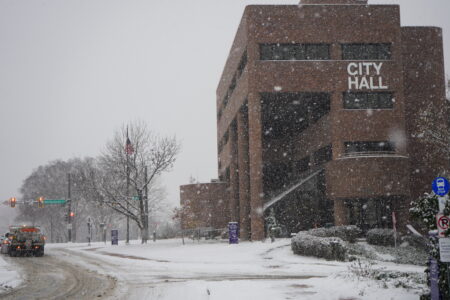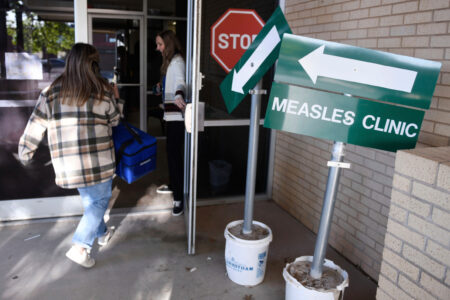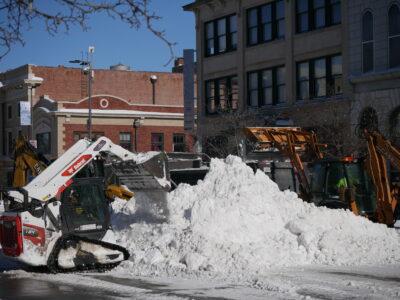Mold found in two Baker University residence halls as residents complain of health problems; assessments are currently underway

photo by: Screenshot
A photo taken of Gessner Hall's Basement Bathroom on Friday, August 23, 2024.
Two days after Baker University began classes, Lawrence-Douglas County Public Health reported “a dangerous level of mold” in two dormitory halls on the campus, which has led to some residents experiencing sore throats and hives.
On Aug. 23, LDCPH issued a letter and a Public Health Order to Baker University after a complaint was filed with the Kansas Department of Health and Environment regarding exposure to mold in Gessner and Irwin Halls on Baker’s campus.
The complaint stated that visible mold was present, and that the complainant and two other people had developed sore throats or hives because of it. It was referred to Lawrence-Douglas County Public Health, which conducted an inspection of both dorms. Upon review with the Kansas Department of Health and Environment, it was determined that there was a significant presence of mold that reasonably could have an impact on health, according to the letter to Baker University.

photo by: Josie Heimsoth/Journal-World
Gessner Hall on Friday, September 6, 2024.

photo by: Josie Heimsoth/Journal-World
Irwin Hall on Friday, September 6, 2024.
Mold thrives in moist environments, which can result from leaks in roofs, windows or pipes, or from flooding. It can grow on a variety of surfaces, including paper, cardboard, ceiling tiles and wood. Additionally, mold can be found in dust, paints, wallpaper, insulation, drywall, carpet, fabric and upholstery, according to the Centers for Disease Control and Prevention.
Exposure to mold can lead to various health issues, according to the CDC. Symptoms may include a stuffy nose, sore throat, coughing or wheezing, burning eyes or skin rashes. Individuals with asthma or mold allergies may experience more severe reactions, and those with weakened immune systems or chronic lung conditions are at risk of developing lung infections due to mold exposure.

photo by: Screenshot
A photo of the laundry room in Gessner Hall on Friday, August 23, 2024.
The mold was present on all levels of Gessner and Irwin halls, including lounges, laundry areas, hallways, dorm room showers, restrooms and more. LDCPH Executive Director Jonathan Smith said in the letter that students would need to be notified about exposure to mold and be presented with available options for alternative housing.
Baker University spokesperson Brandon Milburn told the Journal-World in an email on Thursday that the university had offered multiple supportive measures for students, but he didn’t specify what those were and did not say anything about whether students would be provided with alternative housing.
The Journal-World asked several Baker students residing in both Gessner and Irwin halls on Friday if they had been notified of the mold present in the dormitories. While some students mentioned they were unaware of the situation, others said they had been notified by the university.

photo by: Screenshot
A photo of pipes on the ground floor of Irwin Hall on Friday, August 23, 2024.
Seraphim Peel, one of those students, said that Baker assured students that if anyone felt uncomfortable with their living arrangements, alternative accommodations would be arranged. Peel said that she also had no concerns about the mold and said she thought that the dorms had been clean despite being older buildings.
Lawrence-Douglas County Public Health spokesperson Daniel Smith said in an email to the Journal-World on Friday that Baker had hired an external contractor who specializes in mold remediation, and that assessments were currently underway. In addition, the assessments will include testing for other health hazards; he specifically mentioned testing for asbestos and lead paint, but said that Baker could be testing for even more risks as well if it so desired.
Milburn did not provide any specifics on the nature of the assessments, other than to say that the assessments were in progress. He said Baker could not comment further until there was a full report on the test results and the recommended next steps.

photo by: Screenshot
A photo of an air-conditioned unit on the top floor in Irwin Hall on Friday, August 23, 2024.
Mold has emerged as a concern not only at Baker University but also at Fort Hays State University. KSN reported that earlier this year, several students in McMindes Hall reported mold problems in their dorm rooms, particularly around pipes and air conditioners. The affected students experienced respiratory issues and missed classes due to symptoms of mild mold exposure. In response, the university engaged an environmental firm to assess the air quality in at least 20 dorm rooms, which revealed a “mild” to “moderate” presence of mold.
Mold can present itself in various ways — often appearing as discolored spots and emitting a musty odor. If you encounter these signs, it’s crucial to take action swiftly. To address mold issues, first, ensure you fix any sources of moisture, such as leaks or high humidity. Cleaning mold from hard surfaces can be done with household products, soap and water or a bleach solution, which should be made by mixing no more than 1 cup of bleach with 1 gallon of water, according to the CDC.
However, it’s essential to handle bleach with care. Never combine it with ammonia or other cleaning agents, as this can release toxic gases. Always use waterproof gloves and eye protection when working with bleach.
To prevent mold from growing in the first place, the CDC advises maintaining indoor humidity levels below 50%. Air conditioners and dehumidifiers can help manage humidity levels, and a humidity meter from a home improvement store can assist in monitoring them. Additionally, addressing any leaks promptly can prevent moisture accumulation, further reducing the risk of mold development.
Local Health Officer Jennifer Schrimsher said in an email to the Journal-World that if you have been exposed to mold and are experiencing continued allergy or respiratory symptoms, you should contact your primary care provider.







